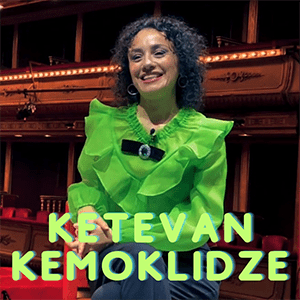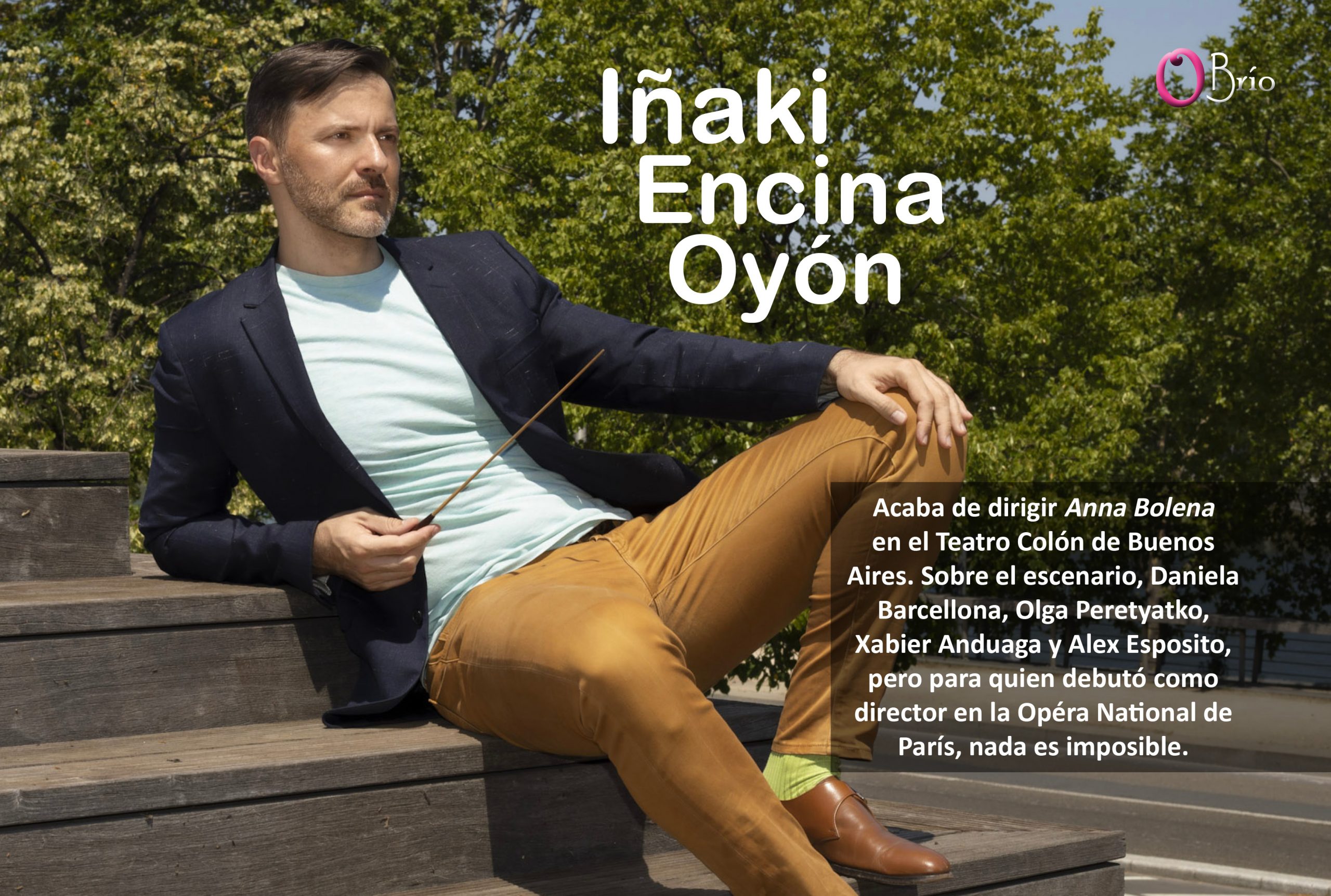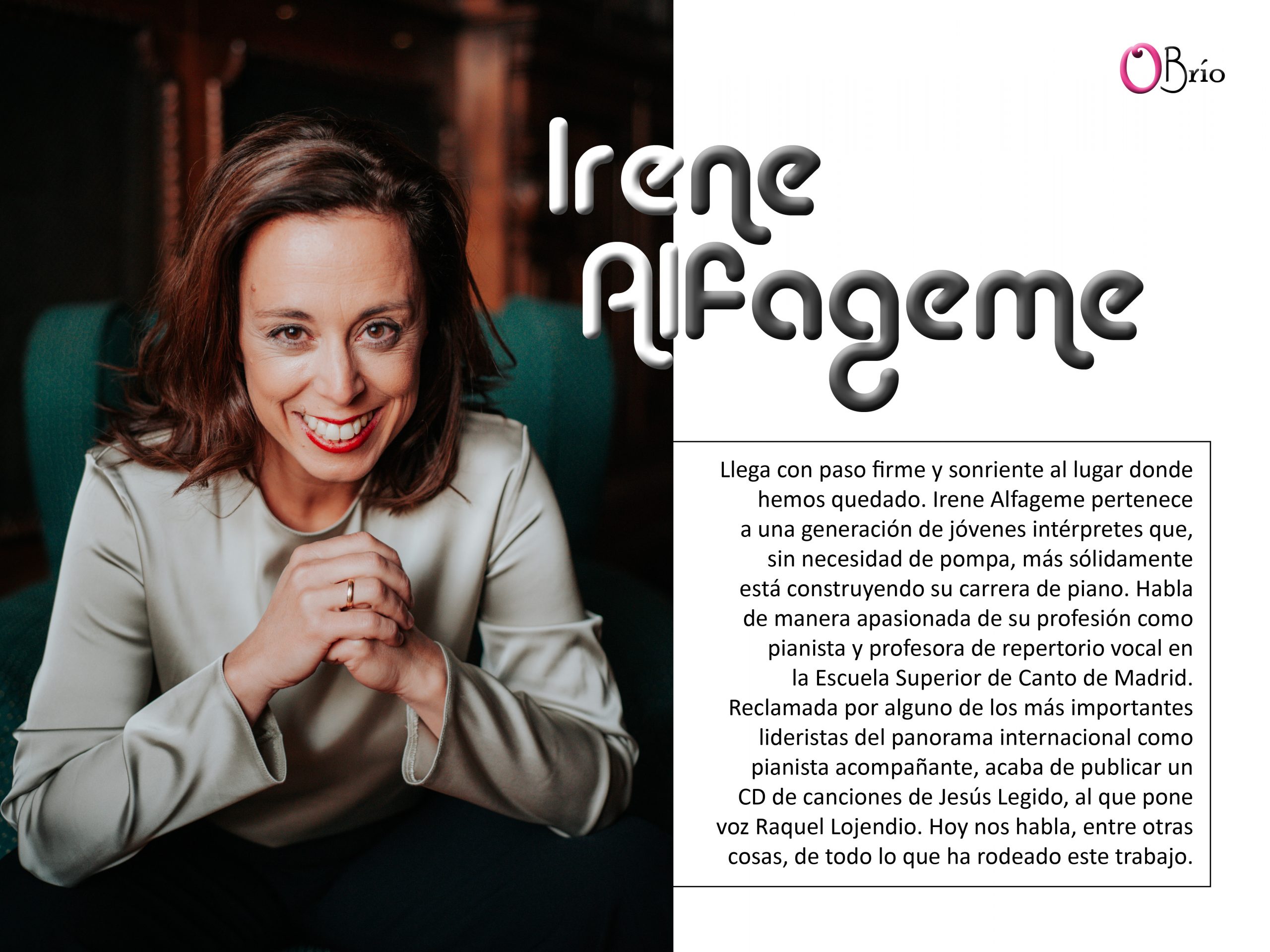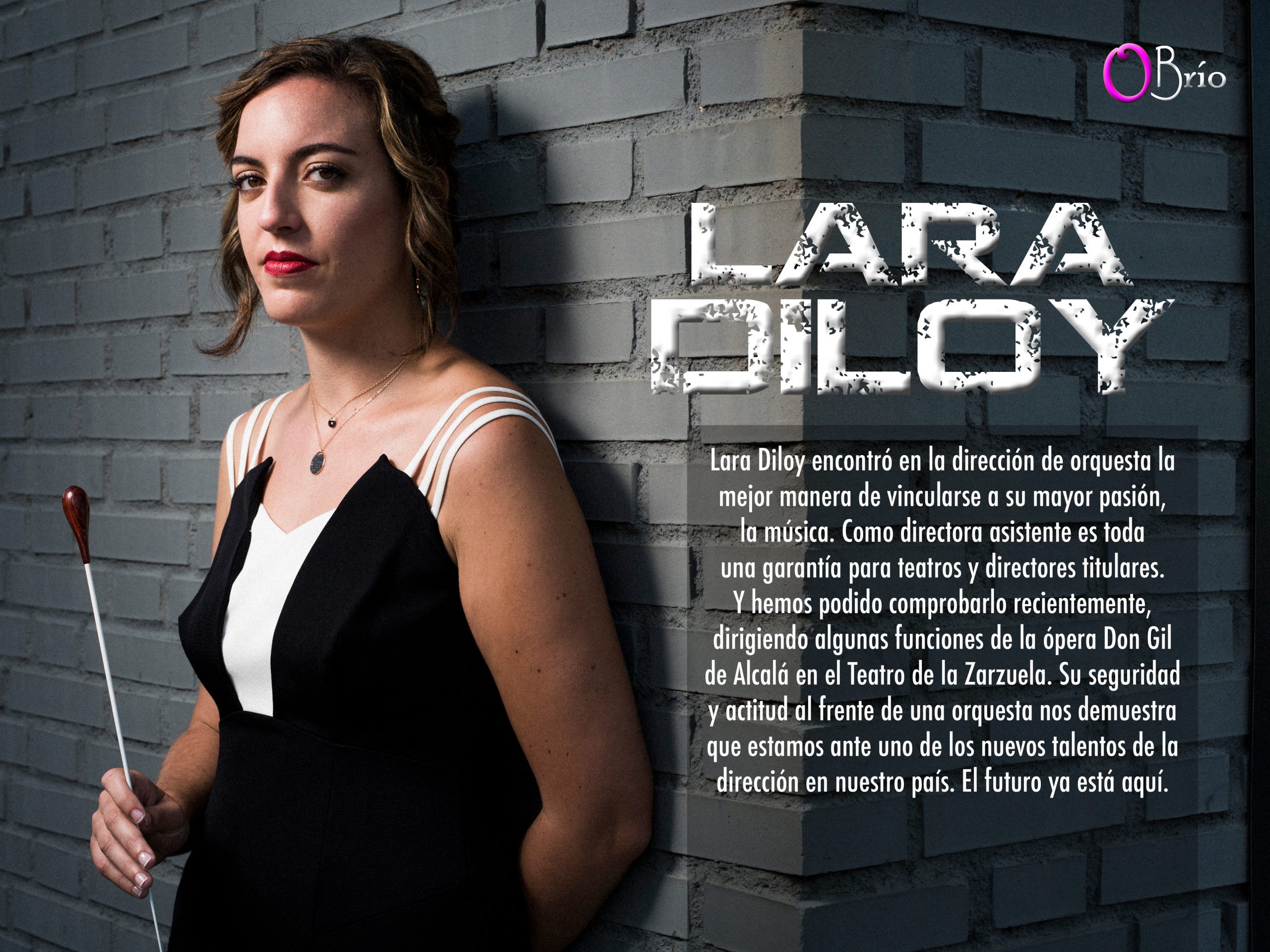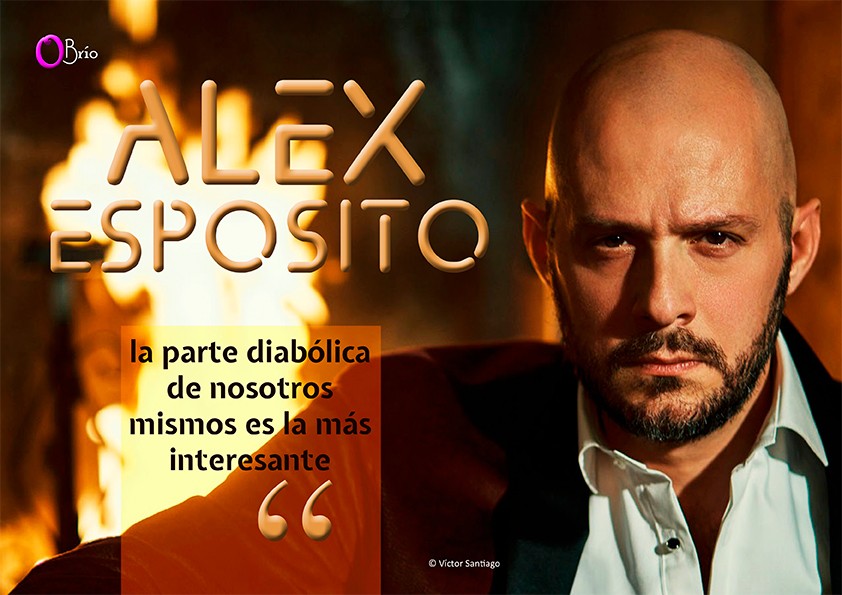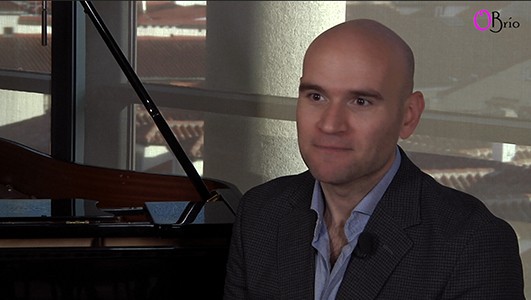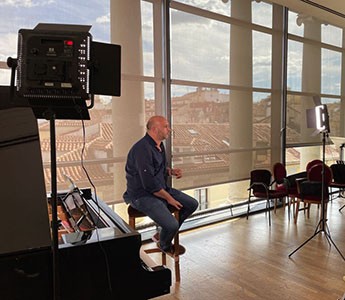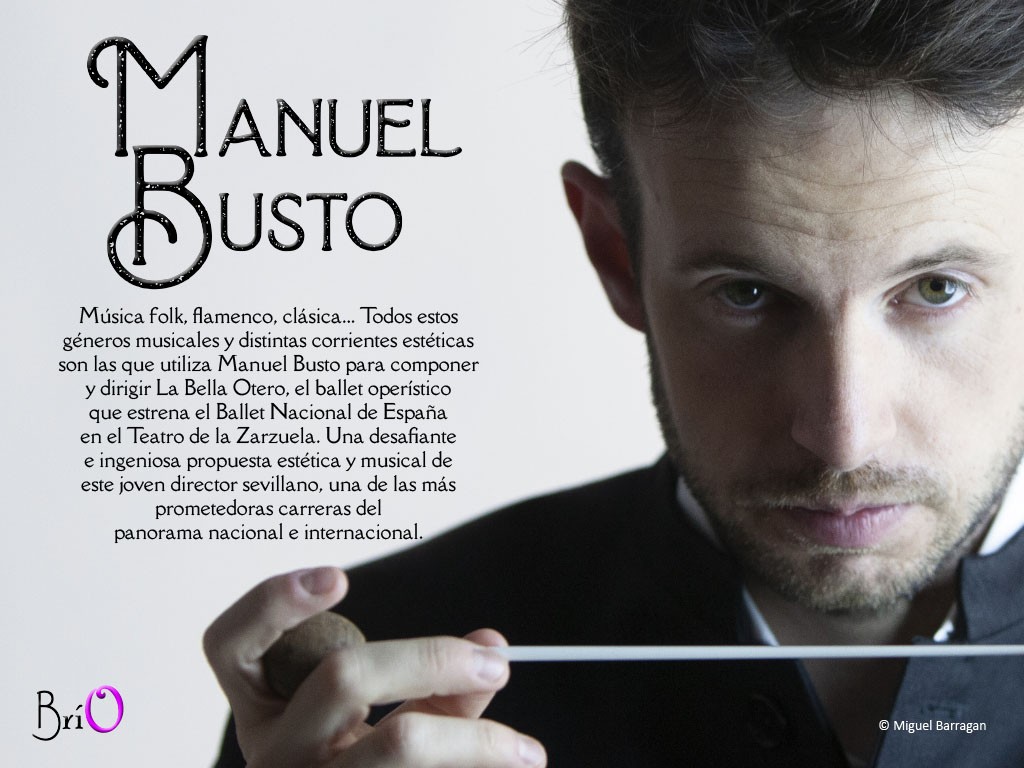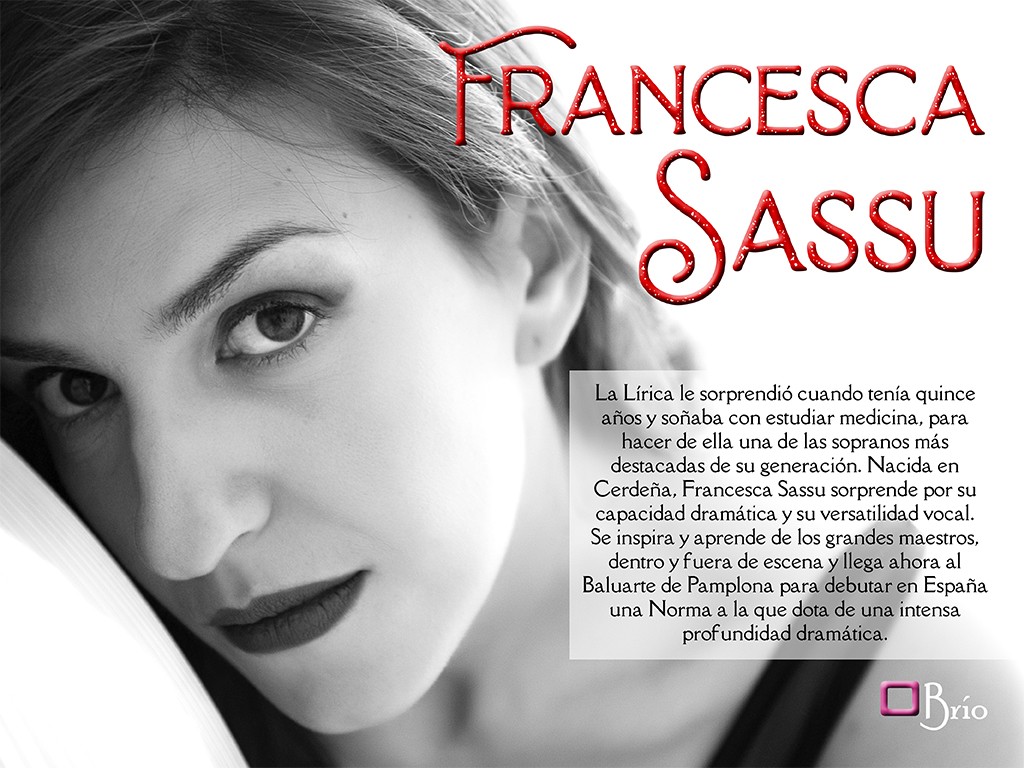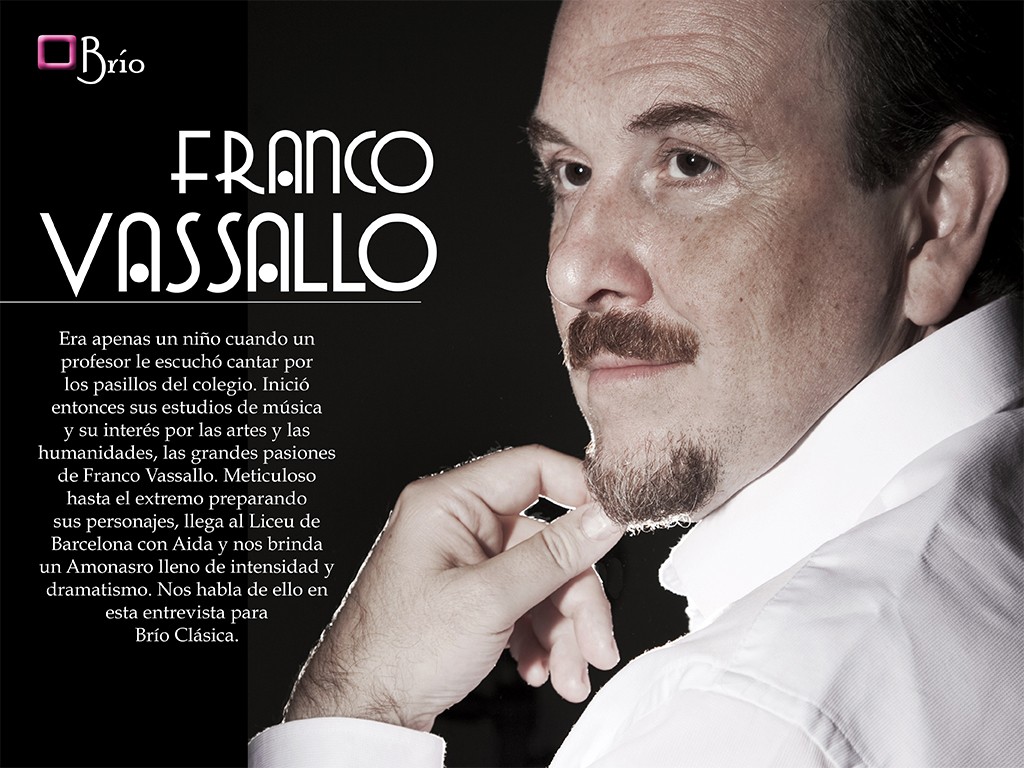Entrevistamos a Annalisa «Adalgisa» Stroppa

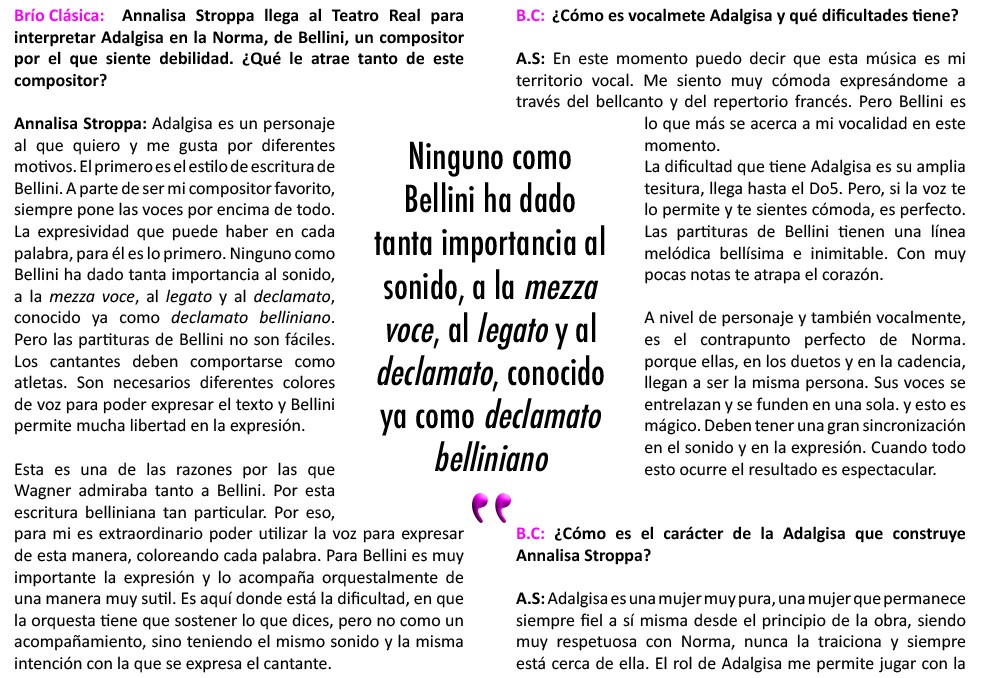
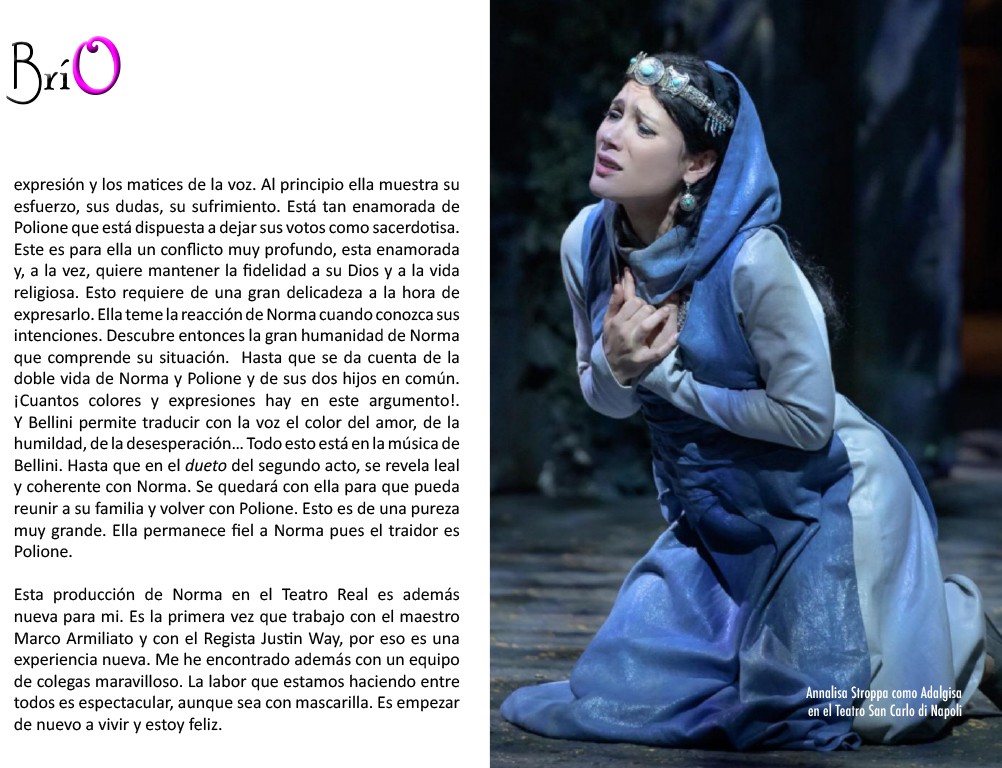
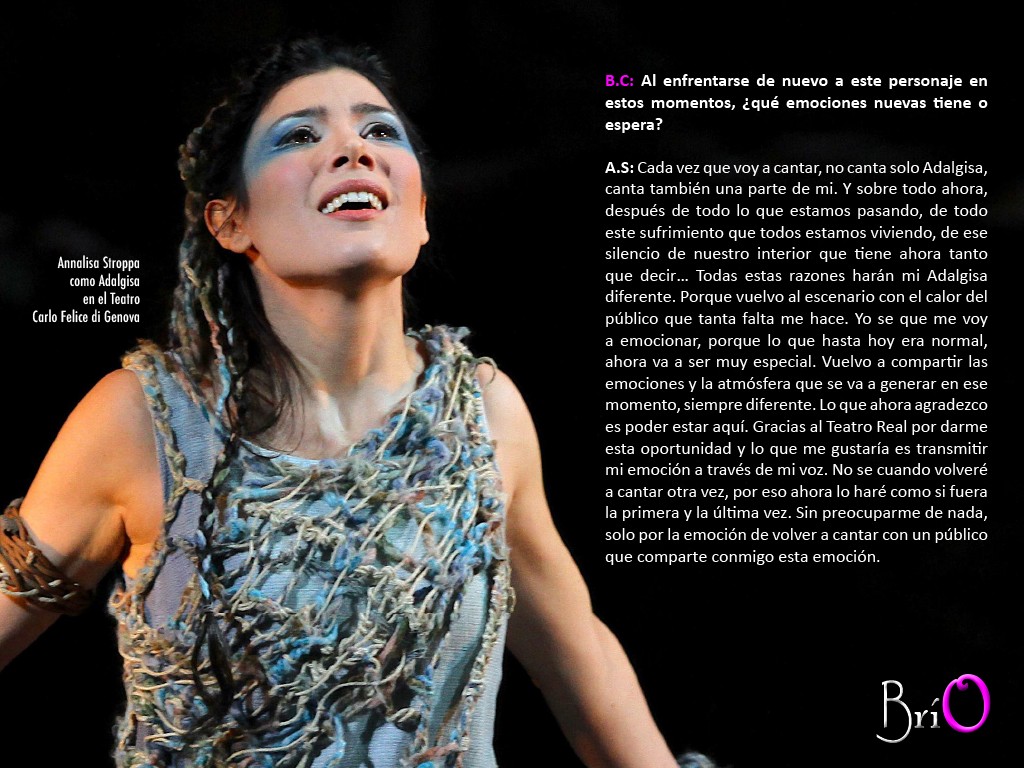
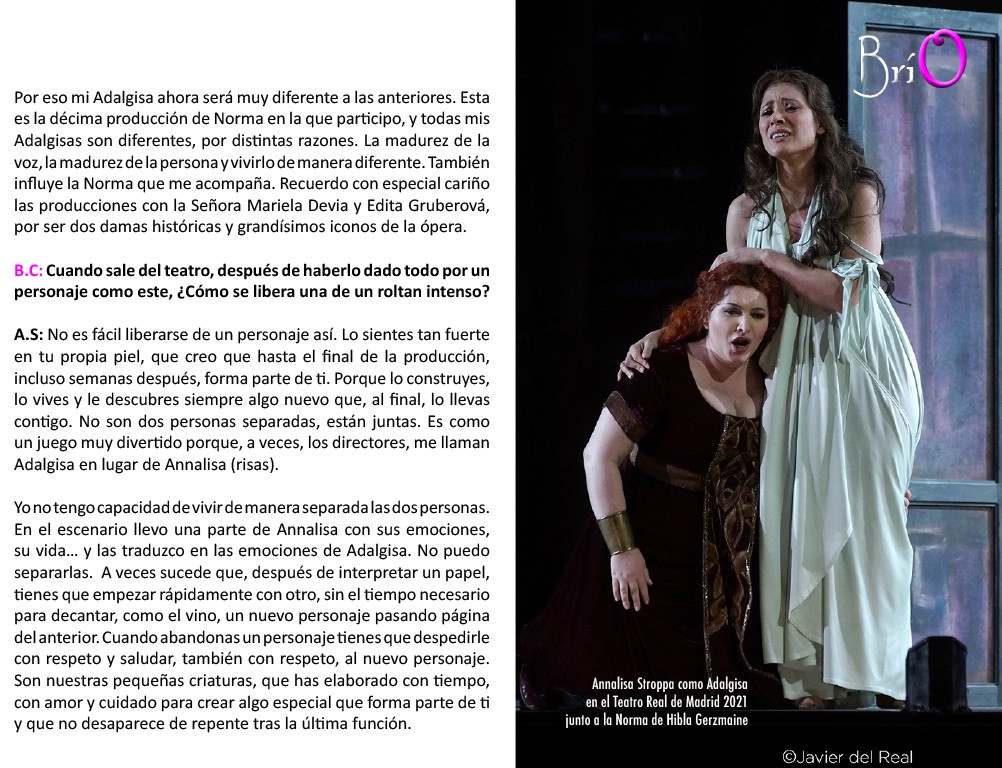
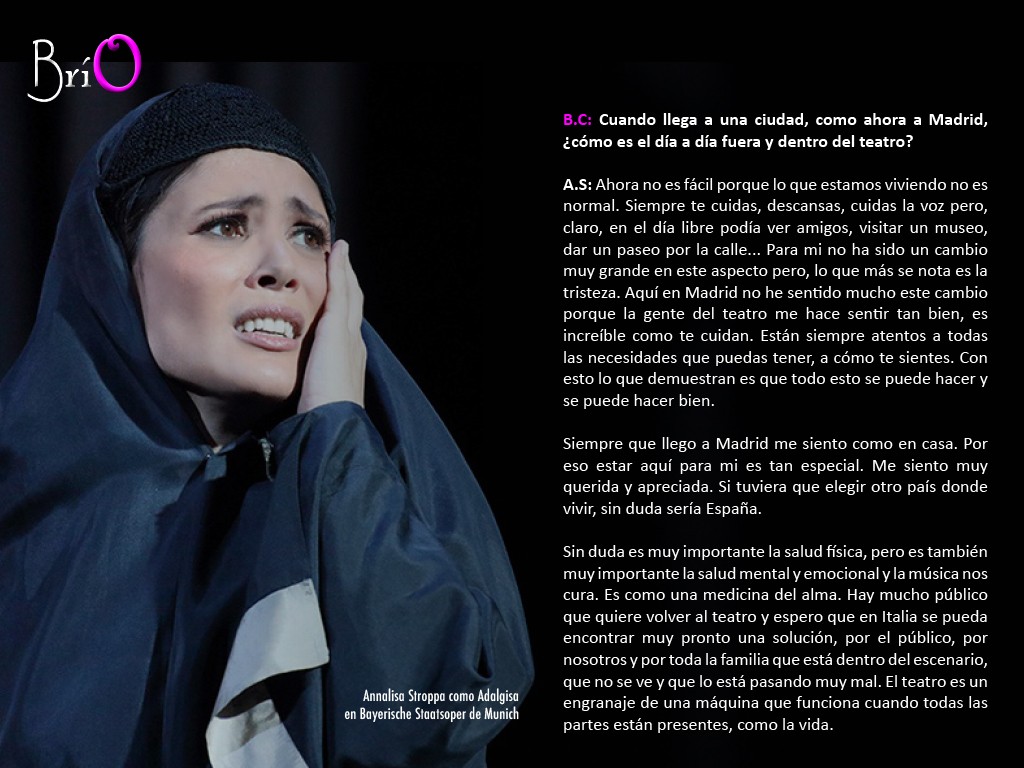
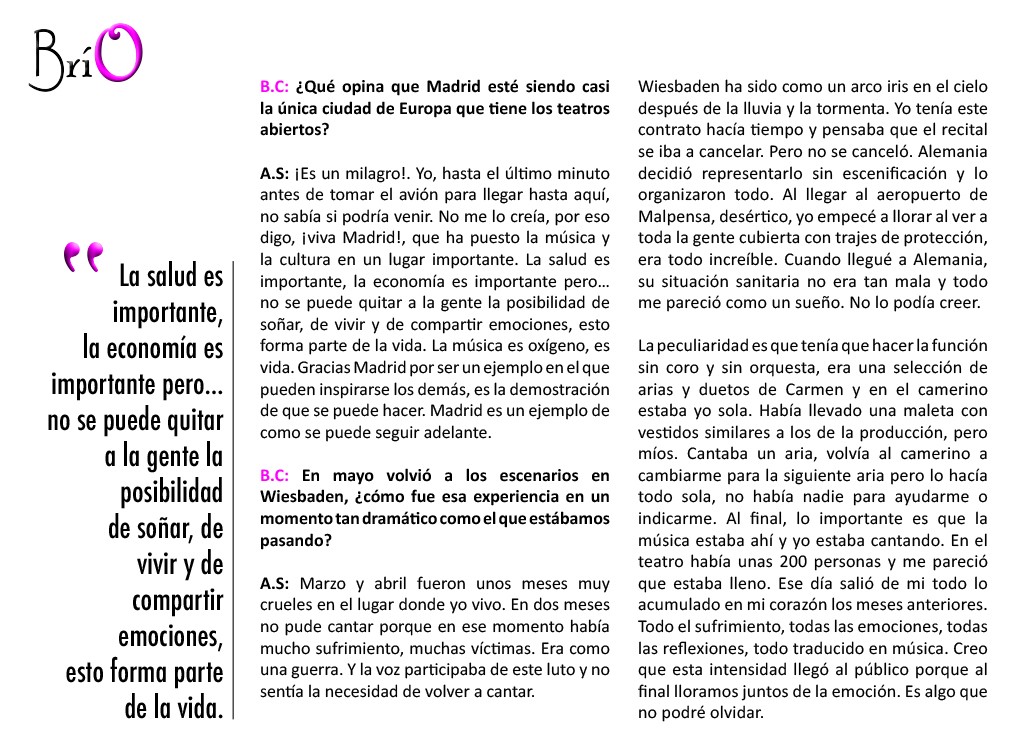
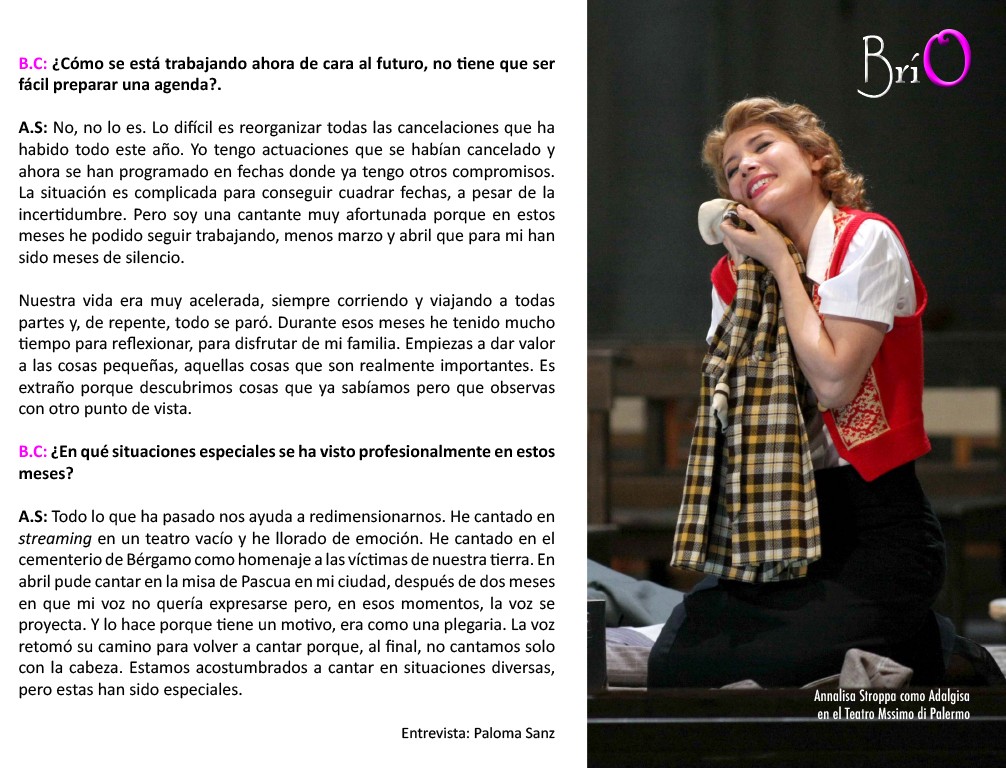
Llega con su mascarilla y tras ella una gran sonrisa, hay vida en la calle, ha salido el sol y se dispone a tomar un café en una terraza. Algo muy diferente a lo que ocurre en su Brescia natal. Es su décima producción de Norma, pero para ella es como la primera vez. Y es que nada es igual, tampoco para Annalisa Stroppa, una Adalgisa puramente belcantista capaz de describir con su voz todos los colores de las emociones que vive su personaje en escena.Brío Clásica: Annalisa Stroppa llega al Teatro Real para interpretar Adalgisa en la Norma, de Bellini, un compositor por el que siente debilidad. ¿Qué le atrae tanto de este compositor?Annalisa Stroppa: Adalgisa es un personaje al que quiero y me gusta por diferentes motivos. El primero es el estilo de escritura de Bellini. A parte de ser mi compositor favorito, siempre pone las voces por encima de todo. La expresividad que puede haber en cada palabra, para él es lo primero. Ninguno como Bellini ha dado tanta importancia al sonido, a la mezza voce, al legato y al declamato, conocido ya como declamato belliniano. Pero las partituras de Bellini no son fáciles. Los cantantes deben comportarse como atletas. Son necesarios diferentes colores de voz para poder expresar el texto y Bellini permite mucha libertad en la expresión.Esta es una de las razones por las que Wagner admiraba tanto a Bellini. Por esta escritura belliniana tan particular. Por eso, para mi es extraordinario poder utilizar la voz para expresar de esta manera, coloreando cada palabra. Para Bellini es muy importante la expresión y lo acompaña orquestalmente de una manera muy sutil. Es aquí donde está la dificultad, en que la orquesta tiene que sostener lo que dices, pero no como un acompañamiento, sino teniendo el mismo sonido y la misma intención con la que se expresa el cantante.B.C: ¿Cómo es vocalmete Adalgisa y qué dificultades tiene?A.S: En este momento puedo decir que esta música es mi territorio vocal. Me siento muy cómoda expresándome a través del bellcanto y del repertorio francés. Pero Bellini es lo que más se acerca a mi vocalidad en este momento.
La dificultad que tiene Adalgisa es su amplia tesitura, llega hasta el Do5. Pero, si la voz te lo permite y te sientes cómoda, es perfecto. Las partituras de Bellini tienen una línea melódica bellísima e inimitable. Con muy pocas notas te atrapa el corazón.A nivel de personaje y también vocalmente, es el contrapunto perfecto de Norma. porque ellas, en los duetos y en la cadencia, llegan a ser la misma persona. Sus voces se entrelazan y se funden en una sola. y esto es mágico. Deben tener una gran sincronización en el sonido y en la expresión. Cuando todo esto ocurre el resultado es espectacular.B.C: ¿Cómo es el carácter de la Adalgisa que construye Annalisa Stroppa?A.S: Adalgisa es una mujer muy pura, una mujer que permanece siempre fiel a sí misma desde el principio de la obra, siendo muy respetuosa con Norma, nunca la traiciona y siempre está cerca de ella. El rol de Adalgisa me permite jugar con la expresión y los matices de la voz. Al principio ella muestra su esfuerzo, sus dudas, su sufrimiento. Está tan enamorada de Polione que está dispuesta a dejar sus votos como sacerdotisa. Este es para ella un conflicto muy profundo, esta enamorada y, a la vez, quiere mantener la fidelidad a su Dios y a la vida religiosa. Esto requiere de una gran delicadeza a la hora de expresarlo. Ella teme la reacción de Norma cuando conozca sus intenciones. Descubre entonces la gran humanidad de Norma que comprende su situación. Hasta que se da cuenta de la doble vida de Norma y Polione y de sus dos hijos en común. ¡Cuantos colores y expresiones hay en este argumento!. Y Bellini permite traducir con la voz el color del amor, de la humildad, de la desesperación… Todo esto está en la música de Bellini. Hasta que en el dueto del segundo acto, se revela leal y coherente con Norma. Se quedará con ella para que pueda reunir a su familia y volver con Polione. Esto es de una pureza muy grande. Ella permanece fiel a Norma pues el traidor es Polione.Esta producción de Norma en el Teatro Real es además nueva para mi. Es la primera vez que trabajo con el maestro Marco Armiliato y con el Regista Justin Way, por eso es una experiencia nueva. Me he encontrado además con un equipo de colegas maravilloso. La labor que estamos haciendo entre todos es espectacular, aunque sea con mascarilla. Es empezar de nuevo a vivir y estoy feliz.B.C: Al enfrentarse de nuevo a este personaje en estos momentos, ¿qué emociones nuevas tiene o espera?A.S: Cada vez que voy a cantar, no canta solo Adalgisa, canta también una parte de mi. Y sobre todo ahora, después de todo lo que estamos pasando, de todo este sufrimiento que todos estamos viviendo, de ese silencio de nuestro interior que tiene ahora tanto que decir… Todas estas razones harán mi Adalgisa diferente. Porque vuelvo al escenario con el calor del público que tanta falta me hace. Yo se que me voy a emocionar, porque lo que hasta hoy era normal, ahora va a ser muy especial. Vuelvo a compartir las emociones y la atmósfera que se va a generar en ese momento, siempre diferente. Lo que ahora agradezco es poder estar aquí. Gracias al Teatro Real por darme esta oportunidad y lo que me gustaría es transmitir mi emoción a través de mi voz. No se cuando volveré a cantar otra vez, por eso ahora lo haré como si fuera la primera y la última vez. Sin preocuparme de nada, solo por la emoción de volver a cantar con un público que comparte conmigo esta emoción.Por eso mi Adalgisa ahora será muy diferente a las anteriores. Esta es la décima producción de Norma en la que participo, y todas mis Adalgisas son diferentes, por distintas razones. La madurez de la voz, la madurez de la persona y vivirlo de manera diferente. También influye la Norma que me acompaña. Recuerdo con especial cariño las producciones con la Señora Mariela Devia y Edita Gruberová, por ser dos damas históricas y grandísimos iconos de la ópera.
B.C: Cuando sale del teatro, después de haberlo dado todo por un personaje como este, ¿Cómo se libera una de un roltan intenso?
A.S: No es fácil liberarse de un personaje así. Lo sientes tan fuerte en tu propia piel, que creo que hasta el final de la producción, incluso semanas después, forma parte de ti. Porque lo construyes, lo vives y le descubres siempre algo nuevo que, al final, lo llevas contigo. No son dos personas separadas, están juntas. Es como un juego muy divertido porque, a veces, los directores, me llaman Adalgisa en lugar de Annalisa (risas).
Yo no tengo capacidad de vivir de manera separada las dos personas. En el escenario llevo una parte de Annalisa con sus emociones, su vida… y las traduzco en las emociones de Adalgisa. No puedo separarlas. A veces sucede que, después de interpretar un papel, tienes que empezar rápidamente con otro, sin el tiempo necesario para decantar, como el vino, un nuevo personaje pasando página del anterior. Cuando abandonas un personaje tienes que despedirle con respeto y saludar, también con respeto, al nuevo personaje. Son nuestras pequeñas criaturas, que has elaborado con tiempo, con amor y cuidado para crear algo especial que forma parte de ti y que no desaparece de repente tras la última función.
B.C: Cuando llega a una ciudad, como ahora a Madrid, ¿cómo es el día a día fuera y dentro del teatro?
A.S: Ahora no es fácil porque lo que estamos viviendo no es normal. Siempre te cuidas, descansas, cuidas la voz pero, claro, en el día libre podía ver amigos, visitar un museo, dar un paseo por la calle… Para mi no ha sido un cambio muy grande en este aspecto pero, lo que más se nota es la tristeza. Aquí en Madrid no he sentido mucho este cambio porque la gente del teatro me hace sentir tan bien, es increíble como te cuidan. Están siempre atentos a todas las necesidades que puedas tener, a cómo te sientes. Con esto lo que demuestran es que todo esto se puede hacer y se puede hacer bien.
Siempre que llego a Madrid me siento como en casa. Por eso estar aquí para mi es tan especial. Me siento muy querida y apreciada. Si tuviera que elegir otro país donde vivir, sin duda sería España.
Sin duda es muy importante la salud física, pero es también muy importante la salud mental y emocional y la música nos cura. Es como una medicina del alma. Hay mucho público que quiere volver al teatro y espero que en Italia se pueda encontrar muy pronto una solución, por el público, por nosotros y por toda la familia que está dentro del escenario, que no se ve y que lo está pasando muy mal. El teatro es un engranaje de una máquina que funciona cuando todas las partes están presentes, como la vida.
B.C: ¿Qué opina que Madrid esté siendo casi la única ciudad de Europa que tiene los teatros abiertos?
A.S: ¡Es un milagro!. Yo, hasta el último minuto antes de tomar el avión para llegar hasta aquí, no sabía si podría venir. No me lo creía, por eso digo, ¡viva Madrid!, que ha puesto la música y la cultura en un lugar importante. La salud es importante, la economía es importante pero… no se puede quitar a la gente la posibilidad de soñar, de vivir y de compartir emociones, esto forma parte de la vida. La música es oxígeno, es vida. Gracias Madrid por ser un ejemplo en el que pueden inspirarse los demás, es la demostración de que se puede hacer. Madrid es un ejemplo de como se puede seguir adelante.
B.C: En mayo volvió a los escenarios en Wiesbaden, ¿cómo fue esa experiencia en un momento tan dramático como el que estábamos pasando?
A.S: Marzo y abril fueron unos meses muy crueles en el lugar donde yo vivo. En dos meses no pude cantar porque en ese momento había mucho sufrimiento, muchas víctimas. Era como una guerra. Y la voz participaba de este luto y no sentía la necesidad de volver a cantar.
Wiesbaden ha sido como un arco iris en el cielo después de la lluvia y la tormenta. Yo tenía este contrato hacía tiempo y pensaba que el recital se iba a cancelar. Pero no se canceló. Alemania decidió representarlo sin escenificación y lo organizaron todo. Al llegar al aeropuerto de Malpensa, desértico, yo empecé a llorar al ver a toda la gente cubierta con trajes de protección, era todo increíble. Cuando llegué a Alemania, su situación sanitaria no era tan mala y todo me pareció como un sueño. No lo podía creer.
La peculiaridad es que tenía que hacer la función sin coro y sin orquesta, era una selección de arias y duetos de Carmen y en el camerino estaba yo sola. Había llevado una maleta con vestidos similares a los de la producción, pero míos. Cantaba un aria, volvía al camerino a cambiarme para la siguiente aria pero lo hacía todo sola, no había nadie para ayudarme o indicarme. Al final, lo importante es que la música estaba ahí y yo estaba cantando. En el teatro había unas 200 personas y me pareció que estaba lleno. Ese día salió de mi todo lo acumulado en mi corazón los meses anteriores. Todo el sufrimiento, todas las emociones, todas las reflexiones, todo traducido en música. Creo que esta intensidad llegó al público porque al final lloramos juntos de la emoción. Es algo que no podré olvidar.
B.C: ¿Cómo se está trabajando ahora de cara al futuro, no tiene que ser fácil preparar una agenda?.
A.S: No, no lo es. Lo difícil es reorganizar todas las cancelaciones que ha habido todo este año. Yo tengo actuaciones que se habían cancelado y ahora se han programado en fechas donde ya tengo otros compromisos. La situación es complicada para conseguir cuadrar fechas, a pesar de la incertidumbre. Pero soy una cantante muy afortunada porque en estos meses he podido seguir trabajando, menos marzo y abril que para mi han sido meses de silencio.
Nuestra vida era muy acelerada, siempre corriendo y viajando a todas partes y, de repente, todo se paró. Durante esos meses he tenido mucho tiempo para reflexionar, para disfrutar de mi familia. Empiezas a dar valor a las cosas pequeñas, aquellas cosas que son realmente importantes. Es extraño porque descubrimos cosas que ya sabíamos pero que observas con otro punto de vista.
B.C: ¿En qué situaciones especiales se ha visto profesionalmente en estos meses?
A.S: Todo lo que ha pasado nos ayuda a redimensionarnos. He cantado en streaming en un teatro vacío y he llorado de emoción. He cantado en el cementerio de Bérgamo como homenaje a las víctimas de nuestra tierra. En abril pude cantar en la misa de Pascua en mi ciudad, después de dos meses en que mi voz no quería expresarse pero, en esos momentos, la voz se proyecta. Y lo hace porque tiene un motivo, era como una plegaria. La voz retomó su camino para volver a cantar porque, al final, no cantamos solo con la cabeza. Estamos acostumbrados a cantar en situaciones diversas, pero estas han sido especiales.
Entrevista: Paloma SanzAdalgisa-AnnalisaStroppa


